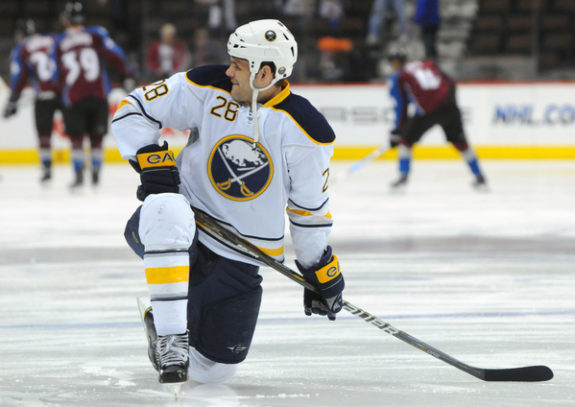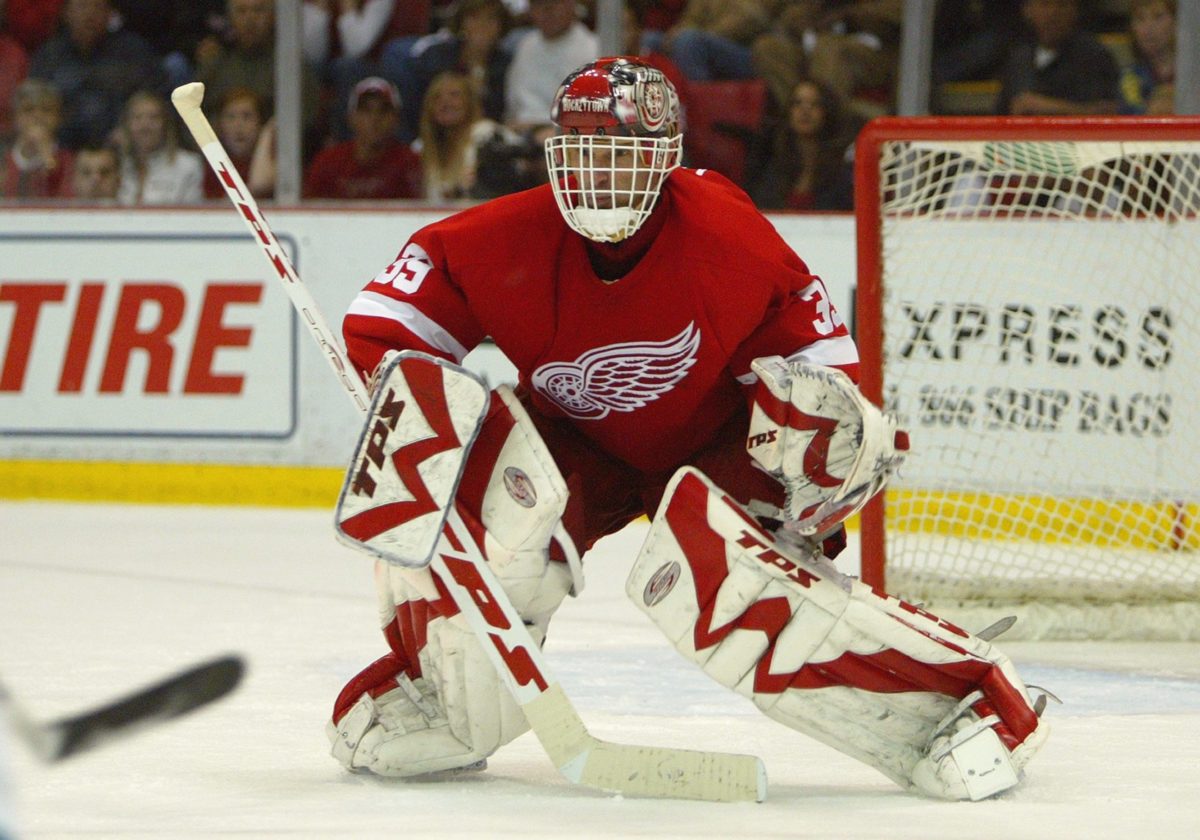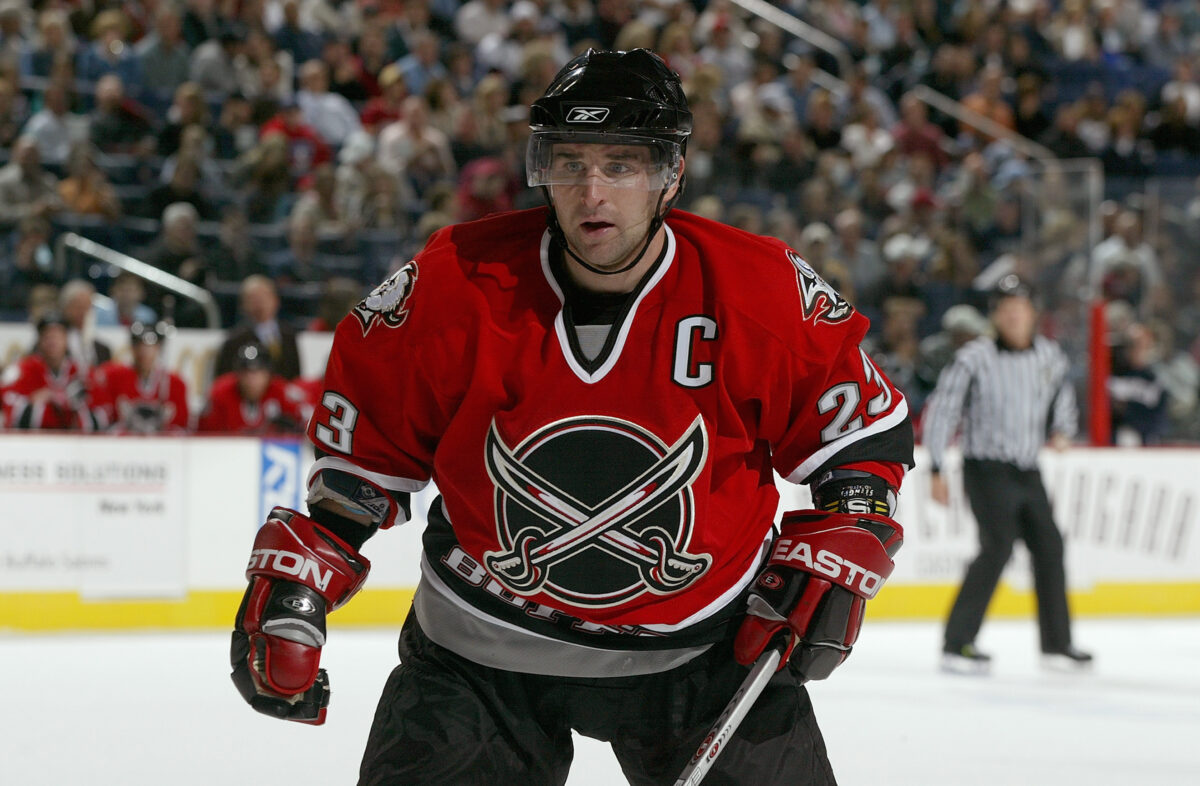As one of the most hapless franchises in the NHL, the Buffalo Sabres have endured quite a few frustrations over the years despite their numerous successes. Now in its fifth decade of existence, multiple generations have moments they look back to and think, “What if that had/hadn’t happened?” Whether in one very specific sense or just in general, it does seem like the people of Buffalo have had more than a few “what ifs” to ponder.
In the last article, we examined four of the most notable times that Sabres fans like to look back on and wonder how differently things might have been, but one list just isn’t enough. Let’s dive even deeper.
What If: There Was No 2004-05 Lockout?
The 2004-05 NHL Lockout was unprecedented in the worst possible way. It was the first time in the history of the four major North American professional sports that negated an entire season of play due to a labor stoppage, and it cemented commissioner Gary Bettman’s image as the most reviled figure in hockey. With the Stanley Cup going into storage and players flocking to overseas leagues, it would be tough to think that there was any good came out of the year in the dark. But strangely enough, in the scope of one NHL team, there was.
Latest THW Headlines
The rebuilding Sabres were on the cusp of taking the next step and had five prospects ready to be brought up for the 2004-05 season. The cancellation prevented that from happening, but it proved to be quite beneficial. With no NHL action, Derek Roy, Jason Pominville, Thomas Vanek, Paul Gaustad and Ryan Miller were given a bonus round with Rochester of the American Hockey League. The quintet emerged fully ready to make the jump and joined the Sabres for the 2005-06 campaign. Though not apparent at first, the transfusion gave the club a major jumpstart, and Buffalo suddenly transformed into one of the best teams in the league. Would this have happened had there not been a lockout?

The five still would have been promoted had the 2004-05 season been played, but the results might not have been the same. The forwards were all age 22 or younger at the time, and adding them would have been much more of a gamble. They wouldn’t have been as poised without the extra year of development and would have had to learn on the fly. And while Miller had been up sporadically over the prior two years, his outstanding 2004-05 AHL season, for which he was named the Goaltender of the Year, was what truly put him on the map. Without it, Martin Biron almost certainly would have remained Buffalo’s starter, and Miller might not have gotten the chance to break through.
The boost received from the five additions propelled the Sabres to the forefront, and they defied every expectation, reaching Game 7 of the 2006 Eastern Conference Final when nobody even thought they’d be a postseason contender. Buffalo might have been a very different team that year without Roy, Pominville and Vanek’s scoring, Gaustad’s strong two-way play and Miller’s excellence in net. And that might not have been possible had hockey not been canceled for a year.
What If: “No Goal” Had Been Overturned?
It’s one of the most talked about moments in NHL history — “No Goal.” In the third overtime of Game 6 of the 1999 Stanley Cup Final, Dallas’ Brett Hull scored to lift the Stars past the Sabres and win them their first (and to date, only) championship. However, replays revealed that Hull’s foot was in the crease before he shot the puck, which was illegal at the time. Buffalo argued to overturn the goal, but the NHL upheld the score, stating that Hull was allowed to be in the crease since he had possession beforehand.
Now, we could argue until the end of days on whether or not the ruling was correct. In the 24 years since, a consensus has never been reached, and it remains one of the most controversial incidents ever to occur on NHL ice. But rather than deliberating that, let’s think of what could have happened if the call had gotten overturned. Sabres fans for years have asserted that their team would have gone on to win the series if it had been. Could that actually have been the case?
What made the 1999 Stanley Cup so intriguing was that it was a David vs. Goliath matchup. The Presidents’ Trophy-winning Stars were the overwhelming favorite, and while they did win the series, they did so nowhere near as convincingly as expected. Their comparatively inferior opponent stepped up to the challenge and proved that they weren’t the least bit intimidated. The Sabres’ rugged physical play, led by Michael Peca, knocked the Stars off their footing, and Dominik Hasek‘s brilliance in goal made for quite the roadblock. Despite the edge Dallas was thought to possess, every game was tightly contested, and only two were decided by more than a single tally.
The series was so close that it’s nearly impossible to conjecture what could have happened had Game 6 continued. The Stars were the better team, and it’s quite possible they still would have prevailed. Perhaps the Sabres would have survived and then fallen in the seventh game. But it is fair to theorize that the underdogs could have finished the job. Based on how competitive of a series they made it, it does seem that there’s a good chance Buffalo could have pulled off what would have been one of the biggest upsets in hockey history.
What If: The Adelphia Scandal Never Happened?
The late 1990s was arguably the Sabres’ greatest period of success to date, but their fortunes shifted rapidly when the calendar flipped to the new millennium. Adelphia Communications CEO and Sabres owner John Rigas was indicted on numerous fraud charges in May 2002, and it very nearly spelled disaster for professional hockey in Western New York. The NHL stripped Rigas of the team in the fallout, and the bankrupt Sabres spent nearly a year as orphans before Rochester, NY, businessman Tom Golisano came to the rescue in March 2003.
Related: Forgotten Sabre Andreychuk Deserves to Have Number Retired
It’s easy to guess what might have happened had Golisano not saved the day, but what if the scandal had never occurred at all? The truth is that it ruined the path that the Sabres were on even before it came to light. They remained competitive in the years that followed “No-Goal” and were eliminated in Game 7 of the 2001 Eastern Conference Semifinal. But that season had been contentious, and issues were beginning to surface (from “What happened to Sabres star Tim Connolly? After 7 years, he’s ready to explain”, The Athletic, 3/12/2020).

Peca became a restricted free agent (RFA) after the 1999-00 campaign, but management refused his requirements for a new contract. He set out the entirety of the next season before getting traded at the 2001 draft. Adelphia was in financial peril at the time, and perhaps the Sabres had no choice but to stonewall their captain because ownership couldn’t afford him any longer. Whether that was actually the case or if the front office was just being stubborn, it was too much for Hasek to stomach, and the future Hall of Famer demanded a trade. Without their top stars, the Sabres declined significantly in the next two seasons.
Assuming that constraints arising from the scandal were the catalyst of these events, it’s safe to surmise that Buffalo could have stayed on course had they retained Peca and Hasek. However, there’s also an interesting converse. Things were never as good as they seemed under Rigas, and it can be argued that the revelation of the scandal saved the Sabres. Golisano stabilized the franchise after years of off-ice issues and re-energized fans as well. Without that, the team’s stunning mid-2000s revival wouldn’t have occurred, and it may have continued to languish under Rigas’ house of mirrors. Perhaps his indictment was a blessing in disguise?
What If: Drury & Briere Had Re-signed?
You all knew this one was coming. A host of players were responsible for the Buffalo’s aforementioned reemergence after the 2004-05 Lockout, but none more so than Chris Drury and Daniel Briere. With one of the youngest teams in the NHL at the time, then-coach Lindy Ruff turned to the duo to provide guidance and direction, naming them co-captains. Both men were equally valuable in different ways. Briere was the team’s offensive catalyst and best player, while Drury was an esteemed locker-room presence whom his teammates universally respected.
With them leading the way, the Sabres took off and turned in two seasons for the ages, reaching the Eastern Conference Final twice in a row in 2006 and 2007. Unfortunately, the euphoria of that run of success only served to make what came next all the more upsetting. Both Drury and Briere were slated to enter unrestricted free agency in the summer of 2007. Both were willing to take the hometown discount to remain in Buffalo, and the front office appeared to have a no-brainer on its hands. But when the time came, unfathomably, it did nothing (from “The Sabres’ most defining moment of the past 20 years: Drury and Briere exit”, The Athletic, 4/23/2020).

The fledgling, young squad suddenly found itself without its parents and was never the same again. After winning the Presidents’ Trophy in 2007, the Sabres plummeted in each of the next two seasons. It’s especially frustrating in hindsight, given that the sky truly seemed to be the limit. Many fans believe they could’ve won a championship had the two re-signed, and it’s easy to see why. Buffalo’s roster was virtually the same the following season, minus Drury and Briere, making it very tough to argue that their absence didn’t make a considerable difference.
Retaining the captains would have allowed the Sabres to continue to run roughshod over the NHL, and when they left, the magic ended abruptly. The team suddenly became a shadow of its former self, and they may have squandered their best opportunity at the Stanley Cup to date. Buffalo hasn’t won a postseason series since 2007 and hasn’t even made it that far since 2011. Would their fortunes have been different had those post-Lockout teams endured? There’s plenty of evidence to support that conclusion, but we’ll just never know.
It’s not always good to dwell on the past, and in the case of “what ifs” for the Buffalo Sabres, that wisdom certainly applies. Did we miss any on either of our lists? What’s your favorite hypothetical in Sabres history?
